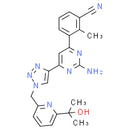Description
AB928, CAS No. 2239273-34-6, is a dual antagonist of the A2aR and A2bR adenosine receptors, leads to greater immune activation and reduced tumor growth when combined with chemotherapy
Product information
CAS Number: 2239273-34-6
Molecular Weight: 426.47
Formula: C23H22N8O
Synonym:
AB928
AB 928
AB-928
Chemical Name: 3-[2-Amino-6-[1-[[6-(2-hydroxypropan-2-yl)pyridin-2-yl]methyl]triazol-4-yl]pyrimidin-4-yl]-2-methylbenzonitrile
Smiles: CC1C(=CC=CC=1C1=CC(=NC(N)=N1)C1=CN(CC2=CC=CC(=N2)C(C)(C)O)N=N1)C#N
InChiKey: BUXIAWLTBSXYSW-UHFFFAOYSA-N
InChi: InChI=1S/C23H22N8O/c1-14-15(11-24)6-4-8-17(14)18-10-19(28-22(25)27-18)20-13-31(30-29-20)12-16-7-5-9-21(26-16)23(2,3)32/h4-10,13,32H,12H2,1-3H3,(H2,25,27,28)
Technical Data
Appearance: Solid Power.
Purity: ≥98% (or refer to the Certificate of Analysis)
Solubility: Soluble in DMSO
Shipping Condition: Shipped under ambient temperature as non-hazardous chemical or refer to Certificate of Analysis
Storage Condition: Dry, dark and -20 oC for 1 year or refer to the Certificate of Analysis.
Shelf Life: ≥12 months if stored properly.
Stock Solution Storage: 0 - 4 oC for 1 month or refer to the Certificate of Analysis.
Drug Formulation: To be determined.
HS Tariff Code: 382200
How to use
In Vitro:
In human in vitro cell cultures, moDC differentiated in the presence of adenosine showed a decreased ability to stimulate IFN-γ secretion from allogenic CD4+ T-cells in a MLR. This suppression is significantly reversed by addition of AB928. Multiplexed gene expression profiling using NanoString identified a cassette of 39 genes that are regulated by adenosine during moDC differentiation. AB928 shows rescue of these gene expression changes.
In Vivo:
Concurrent treatment with AB928 and chemotherapy results in significantly reduced tumor volume in vivo using AT3-OVA tumors; Similar results are observed for the combination of AB928 and NSC 266046. AB928 is also capable of suppressing growth of B16-F10 tumors both as a single agent or in combination with α-PD-1 therapy. AB928 increases the antitumor immune response leading to suppressed tumor growth and increased immune cell infiltration in mouse syngeneic tumors.
References:
- Preparation of azolopyrimidine for the treatment of cancer and immune related disorders By Beatty, Joel; Debien, Laurent; Jeffrey, Jenna; Leleti, Manmohan Reddy; Mandal, Debashis; Miles, Dillon; Powers, Jay; Rosen, Brandon; Thomas-Tran, Rhiannon; Sharif, Ehesan. From PCT Int. Appl. (2018), WO 2018136700 A1 20180726.
Products are for research use only. Not for human use.
Payment & Security
Your payment information is processed securely. We do not store credit card details nor have access to your credit card information.


